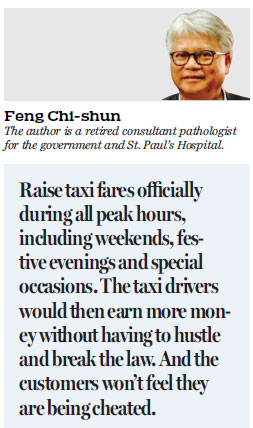Taxi trade needs to take a ride to reality
Updated: 2017-03-20 08:32
By Feng Chi-shun(HK Edition)
|
|||||||
Feng Chi-shun analyzes challenges facing HK's taxi industry and argues for legalizing companies like Uber, and raising flag-fall during peak hours
A lot has happened with the taxi industry recently. The government has approved the trade's application to raise its flag-fall from HK$22 to HK$24; taxi drivers complained they might not get their fair share.
Five Uber drivers were convicted for offering rides without a license. Taxi drivers cheered.
The government announced a revised franchise scheme for premium taxis. About 500 taxi drivers drove their cars to impede traffic at the Legislative Council building to protest. These same taxi drivers cover the "for hire" signs while cruising the busy streets of Wan Chai and Tsim Sha Tsui on Friday nights, stopping only when you wave a HK$500 bill at them.
It's hard to believe but I used to be sympathetic with them because their situation is complicated. A taxi driver would likely earn significantly more than the minimum wage; otherwise he might as well take up an easier job such as a security guard.

Working the night shift pays more. But driving a taxi at night involves some risks. Apart from potentially violent or drunk customers, non-payments are common; such as when triad members or drunk burly men simply refuse to pay, or when a young and fit individual opens the door at a red-light junction and dashes off into the darkness at Olympic speed. With risks come rewards - the hours are shorter, and the money is better, but only if the taxi driver hustles.
Weekends and festive nights, thunderstorms and typhoons are occasions he can make a killing by hustling for a surcharge. He can always justify not taking any customer by claiming, for example, he is about to go home for a meal with his family, and will only take someone whose destination is close to his. But if you double the fare, he is willing to delay his supper.
Hustling is hard work. It also evokes the ire of clients with unpredictable consequences. Taxi drivers are the most hated group of blue-collar workers and they know it.
They may not feel very good about themselves, but they are compensated by making an extra thousand dollars (that's what I heard) per shift in any given night when taxis are in demand. Since there are quite a few of those nights each month, the extra money earned per month can be quite substantial; enough to make the non-hustlers among them green with envy.
Their unethical practice works because there are enough well-off customers taking the bait. Hustling for a surcharge is not something new; it's a part of Hong Kong taxi industry as old as the Lion Rock. The surcharge is breaking the law but the chance of getting caught is slim. Police in sting operations are infrequent and the penalty is not severe enough to be a deterrent.
But the world is changing fast. Their "business model" is unsustainable. Interlopers such as Uber come along to share the loot.
My experience with the Uber service is that it is impeccable, though they rip us off, too, albeit in a more above-board way. The cost of taking you from point A to point B varies as much as the catch of the day. But at least I don't feel cheated.
When five Uber drivers were convicted last week for illegally operating a ride-sharing business and each fined HK$10,000 and banned from driving for one year, my sympathy goes to them. And I am happy to hear the Uber chief executive promised to keep on fighting for their right to do business in this town.
The government also wades in to alleviate the problem, by introducing a franchise scheme involving 600 premium taxis (now renamed franchised taxis). There will be three 200-fleet franchises operated by the highest bidders. They will be newer and better cars but will be as much as 50 percent more expensive than regular taxis.
I shall also add my two cents' worth of recommendations: Raise taxi fares officially during all peak hours, including weekends, festive evenings and special occasions. The taxi drivers would then earn more money without having to hustle and break the law. And the customers won't feel they are being cheated.
A free market economy is always a good thing; hence, legalize companies like Uber but regulate them, making sure they are properly insured and the drivers and cars are up to standard. The taxi license owners might have to be compensated somehow. For the Hong Kong government, it is not a big problem. The money is there.
(HK Edition 03/20/2017 page1)